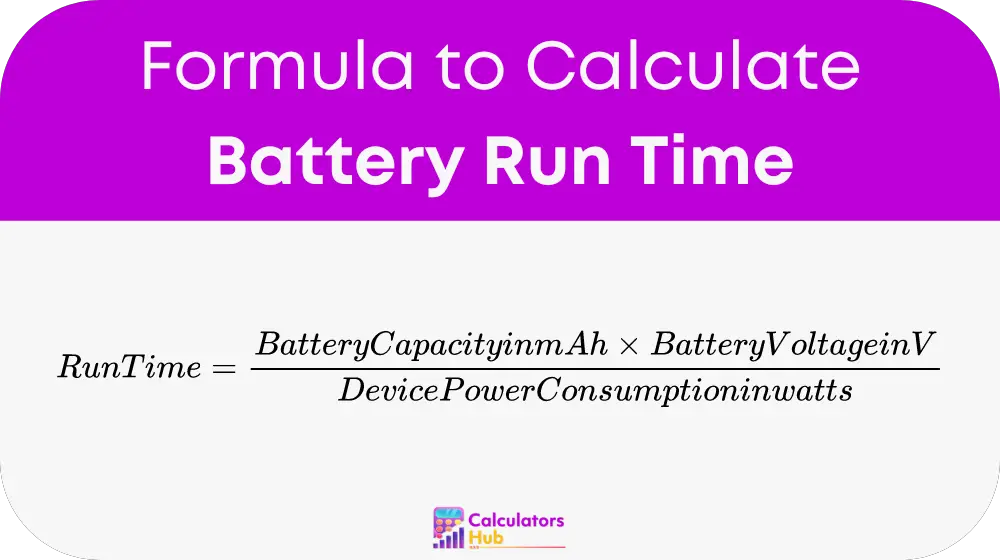The Battery Run Time Calculator is designed to help users estimate how long a battery will power a device based on its capacity, voltage, and the device's power consumption. This tool is crucial for anyone using portable electronics, electric vehicles, or off-grid power systems, where knowing the battery run time can make the difference between smooth operation and unexpected power loss.
Formula of Battery Run Time Calculator
To calculate the run time of a battery, the following formula is used:

Explanation:
- Battery Capacity in mAh: The total charge the battery can hold, measured in milliampere-hours (mAh).
- Battery Voltage in V: The nominal voltage of the battery.
- Device Power Consumption in watts: The power consume by the device being power by the battery, measure in watts.
This formula provides a straightforward way to estimate how long a battery will last when powering a specific device, based on its capacity and the energy demands of the device.
Table for General Terms
To aid understanding, here's a table of key terms related to battery run time calculations:
| Term | Definition |
|---|---|
| Battery Capacity (mAh) | The total charge a battery can store, measured in milliampere-hours. |
| Battery Voltage (V) | The nominal voltage at which the battery operates. |
| Device Power Consumption (W) | The rate at which a device consumes power, measured in watts. |
| Run Time (hours) | The estimated time a battery can power a device before being fully discharged. |
Example of Battery Run Time Calculator
Let's go through an example to demonstrate how the Battery Run Time Calculator works:
Scenario
You have a battery with the following specifications:
- Battery Capacity: 5000 mAh
- Battery Voltage: 3.7 V
- Device Power Consumption: 10 W
Calculation
- Battery Run Time = (5000 mAh * 3.7 V) / 10 W = 18500 / 10 = 1850 / 1000 = 1.85 hours
This calculation shows that the battery will power the device for approximately 1.85 hours before needing to be recharge.
Most Common FAQs
The accuracy of the Battery Run Time Calculator depends on the precision of the input data, including the battery's capacity, voltage, and the device's power consumption. Variations in actual device usage, battery efficiency, and environmental factors can affect the real-world run time.
Yes, the calculator is versatile and can be use for different types of batteries, such as lithium-ion, lead-acid, or nickel-metal hydride, as long as the necessary parameters are know.
Several factors can influence battery run time, including the efficiency of the battery, the age of the battery, the operating temperature, and the actual power consumption of the device, which may vary during use.
Curiosity question: Why can’t you have a choice of either watts & or ma?
Thank you for your curiosity and feedback! The calculator currently focuses on simplifying calculations using watt-hours (Wh) and ampere-hours (Ah) as the primary inputs, since these are the most common units for battery capacity and energy usage calculations. While adding an option for milliamps (mA) could be helpful for smaller devices, it introduces additional complexity in conversion and user input, as both voltage and time would need to be recalculated in a different scale.
For example, 1 ampere (A) equals 1000 milliamperes (mA), and wattage calculations require multiplying this current by voltage (in volts). Converting between milliamps and watts could be added as a feature in the future, depending on user demand.
Your suggestion is valid, and we will consider incorporating it to make the tool even more versatile. Let us know if you have additional thoughts!
It would be very helpful to either stick with all watts or amps due to the fact different measures are used in different countries. Thank you!
Thank you for your valuable feedback! The original approach of using mixed units was chosen to accommodate the most common specifications provided by battery and device manufacturers. Many batteries list their capacity in milliampere-hours (mAh), while devices often specify power consumption in watts (W), making it easier for users to input values without conversion.
However, based on your suggestion, we have now updated the calculator to provide more flexibility and consistency. Users can now:
Select between mAh and Ah for battery capacity.
Choose between Watts (W) and Amps (A) for power consumption.
Automatic unit conversions are applied to ensure accuracy in calculations.